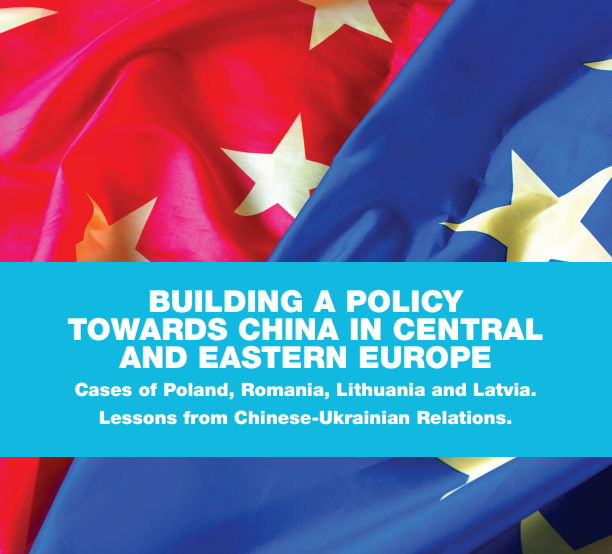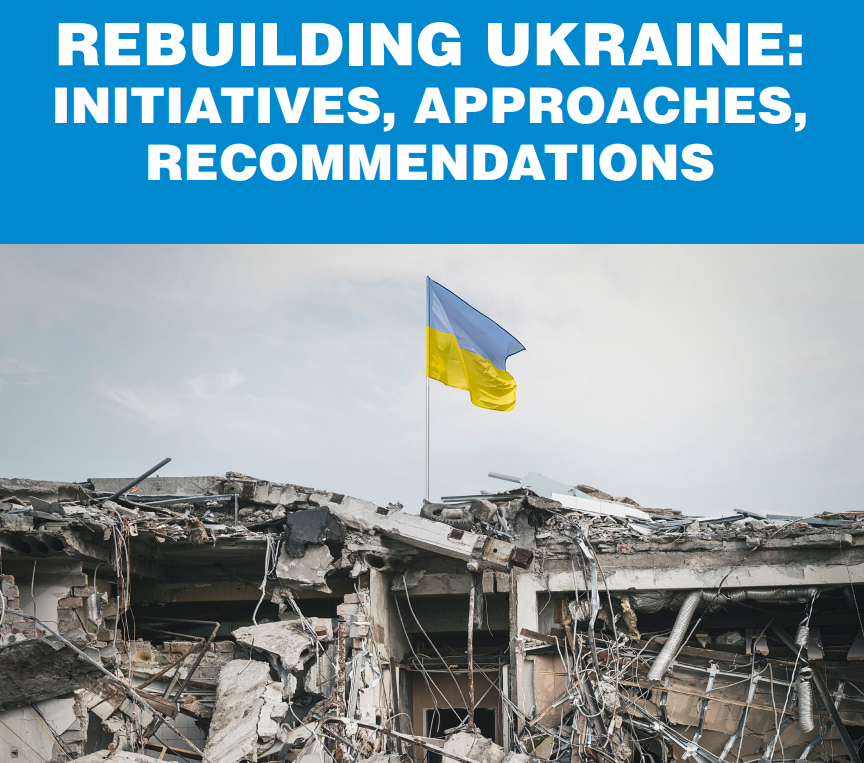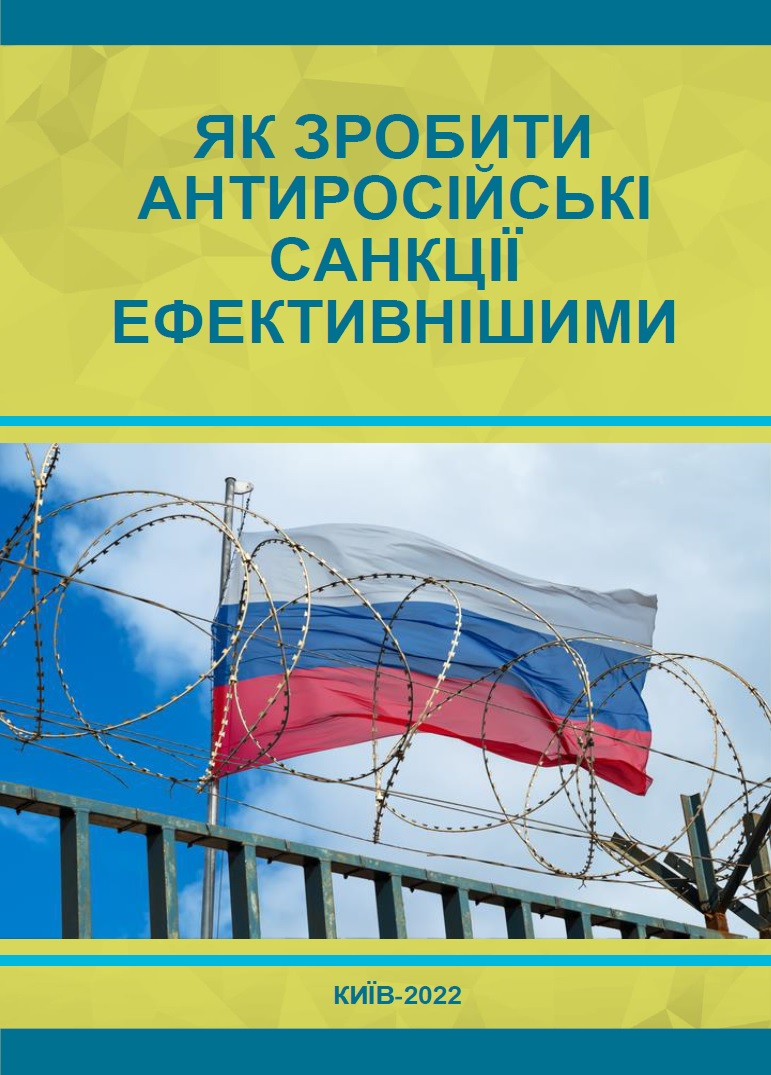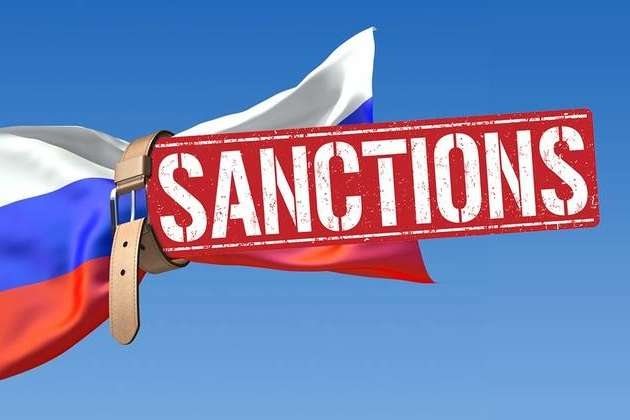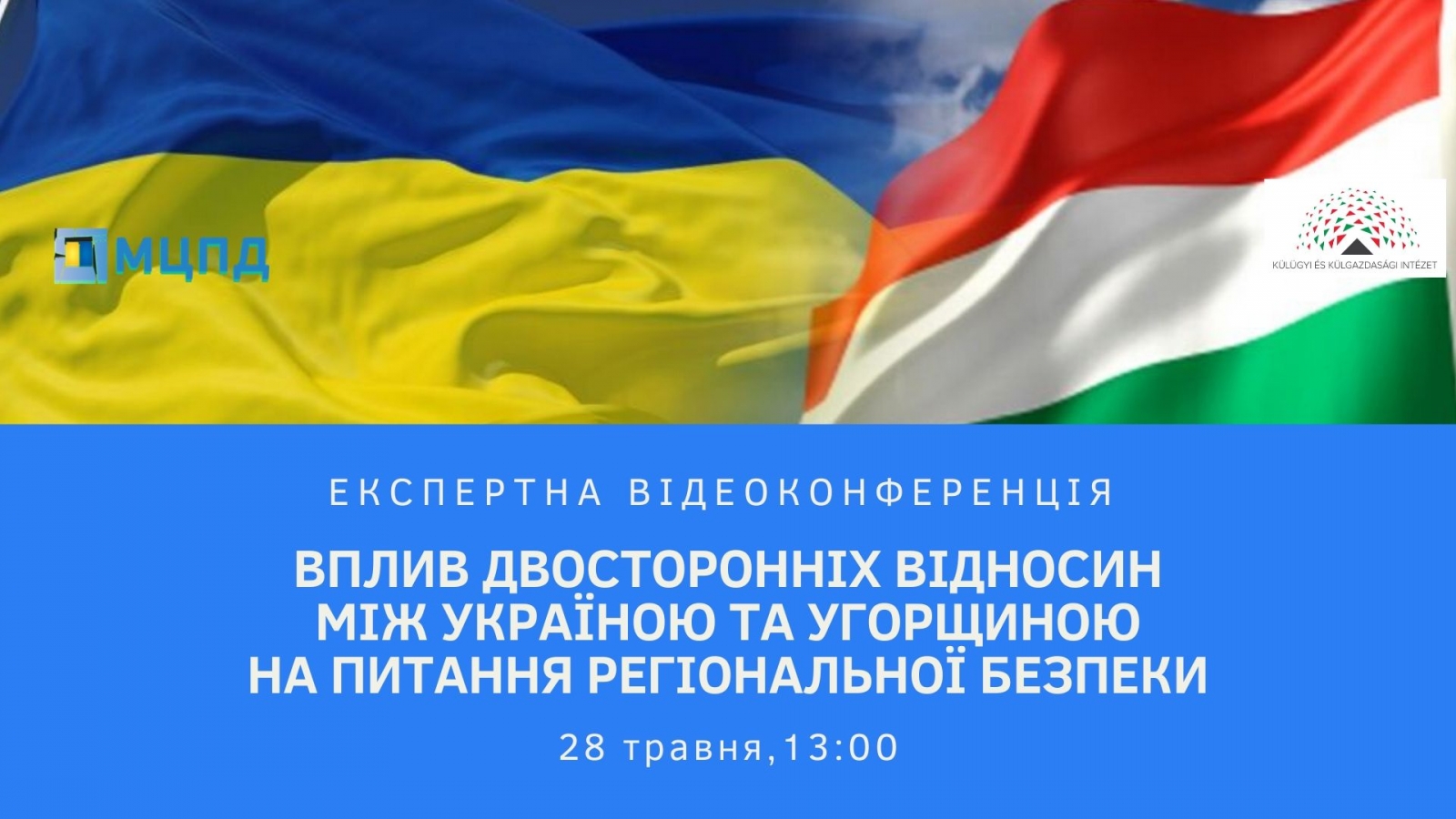Expert discussion: “Anti-Russian sanctions: the instrument of influence or demonstration of weakness”
25.04.2018On April 25, the International Center for Policy Studies held an expert discussion on "Anti-Russian sanctions: an instrument of influence or demonstration of weakness?" The regime of sanctions has been implemented for four years, and the preservation or expansion of its scope has become a peculiar criterion for the success of foreign policy in general. How valid is this criterion? What can be achieved through sanctions and what is the best way of their application?
«Sanctions can help prevent further violations and the use of violence – here there are more chances of success. And this is exactly what worked in the sanctions of the West against Russia. From my point of view, the main role played by Western sanctions is precisely the suspension of further Russian aggression, "said ICPS expert Mykola Kapitonenko.
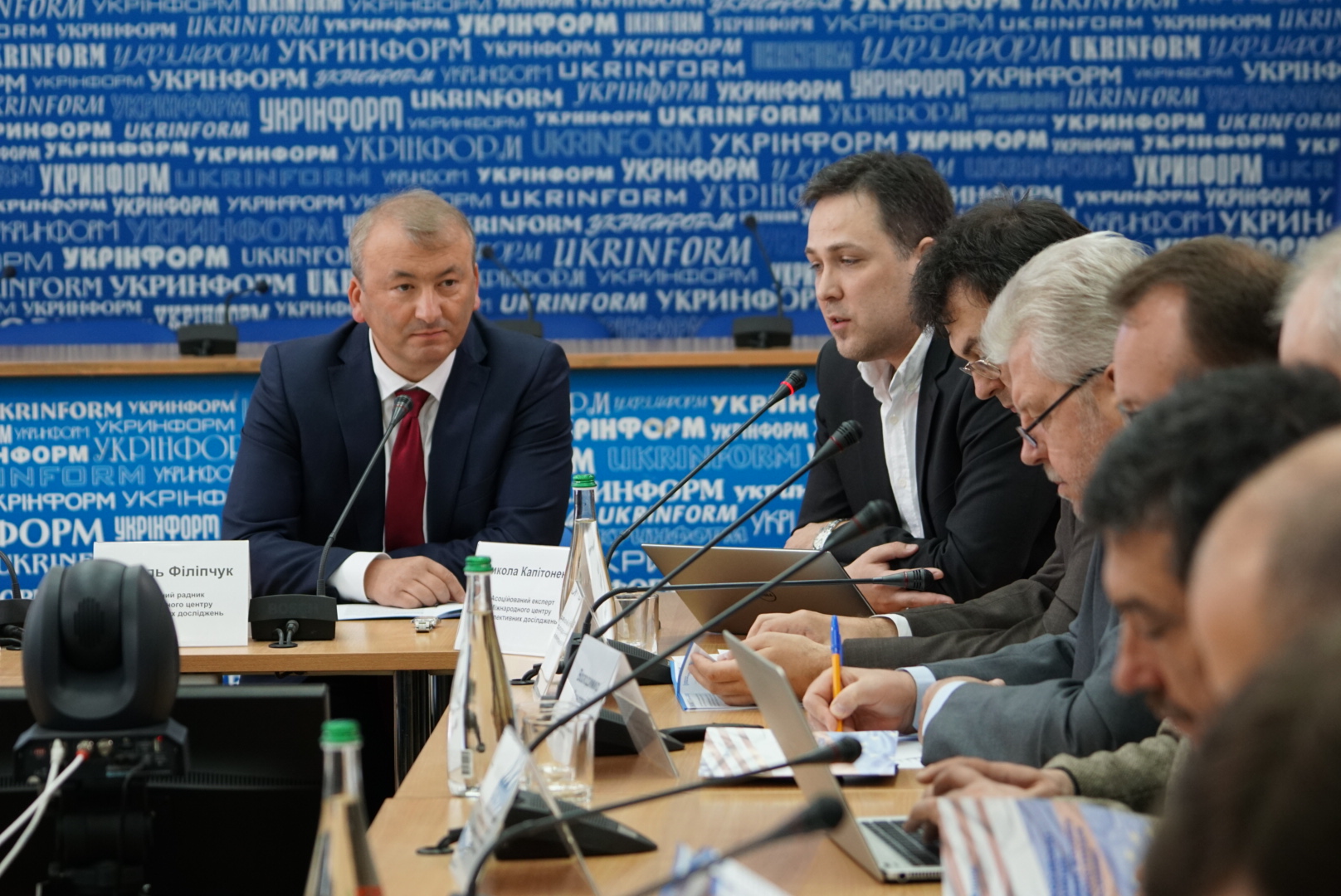
"Sanctions are an instrument, part of a strategy aimed at achieving priority goals. "And sanctions are the instrument that has its own price and fairly limited effectiveness which leads to creating complex dilemmas over time because it has rather controversial consequences," he said.
As a rule, sanctions are imposed to influence a country that violates agreed norms, international principles with a view to changing its behavior. They are relatively frequent: among 26 sanction programs currently conducted by the United States 12 were initiated over the past 10 years; the United Nations has imposed sanctions more than 20 times since the end of the Cold War, however before only twice. Today in the vast majority of cases there are imposed the so-called "targeted" sanctions as opposed to comprehensive sanctions, which were much more popular until the 20th century. The key difference between them is to differentiate between those responsible for implementing a particular policy of groups or individuals from the rest of the population, the expert said.
According to ICPS research, statistics of recent decades indicate that only in one of every fourth case, economic sanctions have led to significant changes in the behavior of the state against which it was imposed. The highest effectiveness of sanctions - about 50% - is observed in the case of destabilization of the political regime. But in such a case there are significant reservations: external factors can become a factor in consolidating society around the ruling power. Meanwhile, according to Kapitonenko, the sanction policy of the West is now not aimed at changing the regime in Russia.
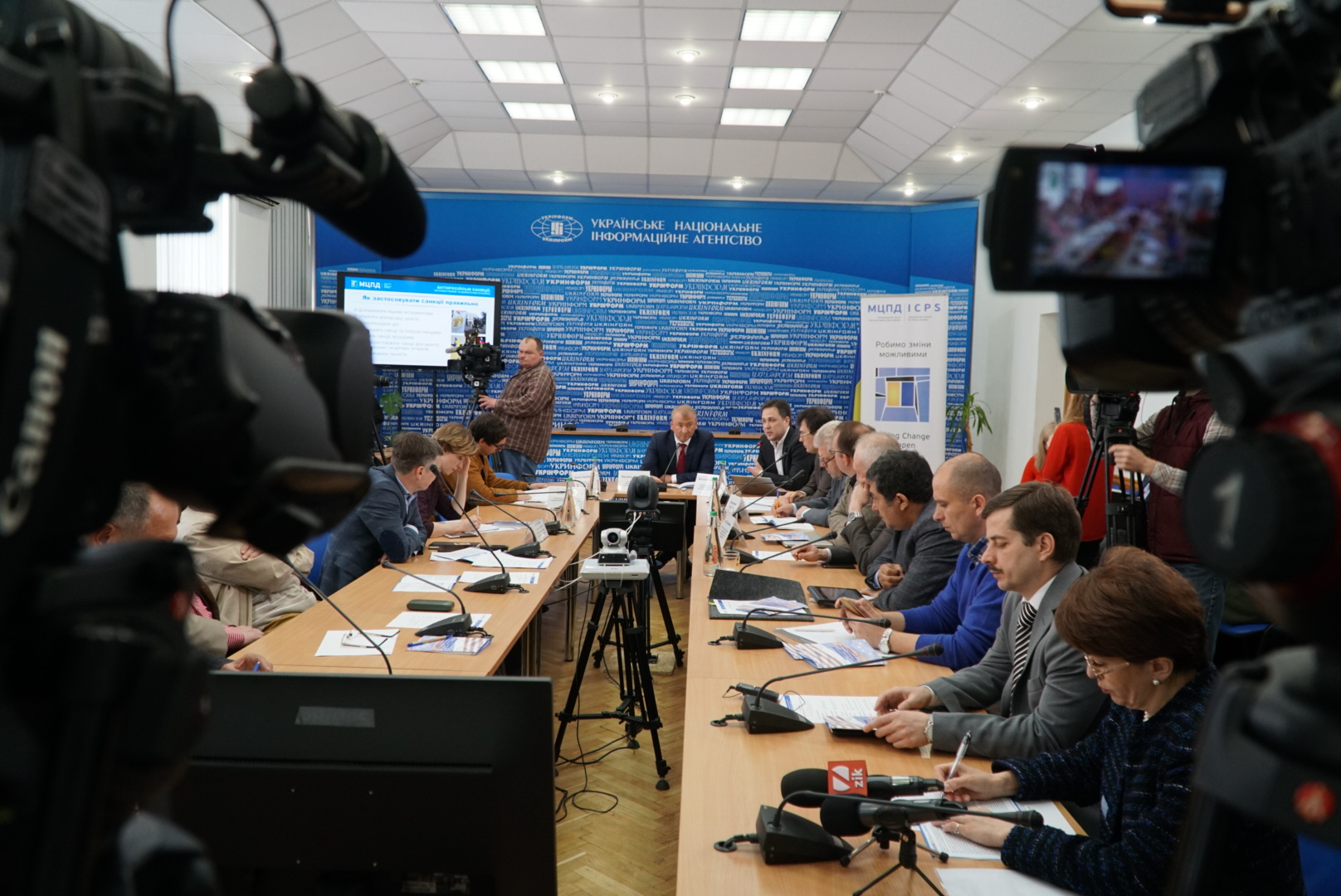
Speaking about the recommendations on the application of sanctions against Ukraine by Russia, the expert emphasized the importance of maintaining meaningful dialogue with the partner states: the more profound is the understanding of the interests and controversial assessments / positions of the partners regarding anti-Russian sanctions, the more productive and prolonged cooperation will be in this direction. It is important to create a hierarchy of goals that need to be realistic, taking into account the potential and the limit of the effectiveness of sanction policy. Alongside this, restrictive measures against the Russian Federation should be expanded, as long as the emphasis be made on target sanctions, in particular personal, he said. In addition, asymmetry in relations between Ukraine and Russia should be taken into account, because, according to the expert, in this case Ukraine is a weak and vulnerable party that essentially distinguishes Ukrainian anti-Russian sanctions from the West.
Also, economic sanctions should have a transparent procedure and control over their implementation in order not to become an instrument of internal political struggle with competitors, "Kapitonenko noted.
The International Center for Policy Studies has prepared recommendations on the strategy for applying sanctions:
- Supporting a more meaningful dialogue with partner countries. The more profound the understanding of their interests and contradictory assessments / positions regarding anti-Russian sanctions is, the more productive and lasting will be cooperation in this direction;
- Create a hierarchy of goals. The sanction strategy - like any other - cannot be effective without identifying the primary goals. They need to be realistic, taking into account the potential and limit of the effectiveness of sanction policies;
- Determination of optimal characteristics of the sanction regime;
- An important and effective instrument is the combination of sanctions with threats of subsequent sanctions, as well as with other instruments of pressure;
- A more in-depth study of a multilateral format of anti-Russian sanctions is needed. On the one hand, the common stance of as many countries as possible concerning the issue of anti-Russian sanctions makes their use not so expensive or risky for each of them individually;
- Asymmetry in relations between Ukraine and Russia must be taken into account;
- Sanctions should be state policy instrument followed by clear and understandable application of logic and transparent rules. Transforming them into a means of combating competitors will discredit not only Ukrainian sanctions against Russia, but also undermine the effectiveness and credibility of sanctions in general;
- The use of sanctions – the complex and sometimes contradictory instrument with due regard to the asymmetry of Ukrainian-Russian relations is rather expensive. Therefore, it should be an element of two strategies: the settlement of the conflict in eastern Ukraine and the determination of the format of bilateral relations with Russia.
ICPS experts researched the question of building a policy towards China in Central and Eastern Europe
ICPS has prepared an analytical study focused on the evolution of China's regional policy in Central and Eastern Europe, as well as recommendations for developing policies towards China in the region. The "One Belt, One Road" initiative has become a key tool for promoting China's geopolitical interests and implementing its grand strategy aimed at changing the existing international order. This global initiative encompasses transportation, logistics, trade, and investment projects, promoting China's transition to a new level of influence and responsibility. Europe plays an important role in this. The European market is a natural "center of gravity" for China's export-oriented economy; Beijing seeks to build strong cooperation with Europe based on active trade and interdependence. China, in its turn, is also an important trading and economic partner for Europe. Central and Eastern European countries (CEE) have in some sense become "gateway" to Europe for China. Seeking to deepen relations with them and involve in its own infrastructure projects, China has developed and implemented a regional policy within the framework of the "14+1" initiative (previously "16+1" and "17+1"), as well as on a bilateral level. This Chinese activity has elicited ambiguous reactions both among participating states and among other EU members. Russia's invasion of Ukraine has brought new problems to the agenda and significantly weakened China's position in Europe, particularly in the CEE. Political and security issues have taken priority over trade and infrastructure. The ongoing war has forced both China and countries of the region to adjust their perceptions and policies towards each other. The most vivid trends and problematic issues are examined in the paper utilizing the experience of Poland, Romania, Lithuania, and Latvia. Taking also into account Ukraine's experience in building relations with China, recommendations are provided for the main elements of CEE's policies towards China. More information can be found at the following link: https://icps.com.ua/en/our-projects/publications/building-a-policy-towards-china-in-central-and-eastern-europe/
What are the main problems of reconstruction plans for Ukraine and what are the ways to solve them: experts provided recommendations
International Centre for Policy Studies has presented the document "REBUILDING UKRAINE: INITIATIVES, APPROACHES, RECOMMENDATIONS", which analyzed different aspects of the future reconstruction process for Ukraine. According to various estimates Ukraine's total losses resulting from Russian aggression at the end of 2022 constituted around 700 billion US dollars. This amount has been increasing every day of Russian attacks and bombardments targeting civilian infrastructure and killing innocent people. The international community recognizes the need to finance reconstruction of Ukraine. There have been many international conferences, expert studies and discussions on that. However, there is currently no consensus on sources or tools for Ukraine's rebuilding projects, no agreed overall concept of how the process will be conducted and implemented. Meanwhile, needs of Ukraine for reconstruction are urgent and vital to keep country viable and able to withstand Russian continuing aggression. This necessitates an in-depth study of the issue as well as public and expert discussions to suggest appropriate decisions. In this paper the International Center of Policy Studies examines existing international experience of post-war reconstruction with a special attention to good examples, which can be used by Ukraine. Existing initiatives regarding the reconstruction of Ukraine are analyzed with a focus on new ideas and recommendations, which can be used in this process. The study intends to contribute to current expert discussions in Ukraine and among our partners on reconstruction of the country during and after the war. You can read/download the ICPS publication "REBUILDING UKRAINE: INITIATIVES, APPROACHES, RECOMMENDATIONS " by following the link: https://icps.com.ua/en/our-projects/publications/rebuilding-ukraine-initiatives-approaches-recommendations/
How to make sanctions more effective: ICPS analysts offered new ideas
International Centre for Policy Studies has presented the document "How to make anti-Russian sanctions more effective", which analyzed the gaps in the sanctions policy. It is noted that the international community has adopted seven packages of sanctions against Russia since its full-scale invasion of Ukraine in 2022. Over 50 countries have in some form joined the sanctions regime. Some states, such as Israel and China, don't adopt sanctions but block potential ways for Russia to evade their effect. Mainly, it is the developing countries that don't implement the sanctions regime, while the collective West is decisive and united in its exploit of the tool. Akin to 2014 and after, sanctions constitute a complex mechanism of selective action. They are not absolute but rather operate in different sectors and against particular individuals or legal entities. In addition to sectoral sanctions, diplomatic and visa restrictions are in place. At the same time, to make the sanctions more effective, the international community should fill the gaps that allow for a selective designation of Russian oligarchs and politicians. It requires a systemic analysis and monitoring aimed at finding these gaps, then sanctioning the individuals who had avoided personal sanctions. Accordingly, this document contains not only an analysis of the sanctions policy, but also recommendations for minimizing its gaps. You can read/download the ICPS publication "How to make anti-Russian sanctions more effective" by following the link: https://icps.com.ua/en/our-projects/publications/how-to-make-anti-russian-sanctions-more-effective/
SINO-UKRAINIAN RELATIONS: RESEARCH PAPER
In context of the ICPS' latest project on monitoring foreign economic relations, ICPS experts have conducted extensive research, round table debates and in-depth analysis of the current status of Sino-Ukrainian relations. China's political interest and economic investments in Ukraine has risen exponentially since the announcement of the One Belt One Road Initiative, yet is Ukraine ready for intensifying bilateral relations with such a world power? For more details, read the ICPS' latest study.
Austrian experts and diplomats discussed ICPS study “Sanctions against Russia”
Sanctions must remain a key instrument of pressure on Russia to restore Ukraine's sovereignty and territorial integrity. This conclusion was reached by Ukrainian and Austrian foreign policy experts during expert discussion of the ICPS study “Sanctions against Russia: current state, prospects, successes and gaps of the multilateral international sanctions regime against Russian Federation”, which took place on Tuesday, June 3, in the format of online discussion. About 40 Austrian and Ukrainian diplomats, analysts and foreign policy experts took part in online discussion “Sanctions against Russia: are they still effective?”, organized by ICPS in conjunction with the International Institute for Peace (IIP, Vienna) with the support of the International Renaissance Foundation. The speakers were Hannes Swoboda, President of the International Institute for Peace (IIP), Peter Havlik, expert at the Vienna Institute for International Economic Studies, Anastasia Galushka, ICPS expert in international law and human rights and Mykola Kapitonenko, ICPS associate expert. The participants of discussion stressed the need to continue sanctions against Russia, as Russia's actions in Ukraine are a challenge not only for our country, but for the entire international community which is why they must receive a joint coordinated response. “Sanctions, as a tool “between wars and words”, remain the only way to put pressure on Russia's foreign policy while limiting its destructive potential for international security,” ICPS expert in international law and human rights Anastasia Galushka said. According to Mykola Kapitonenko, combination of different types of sanctions will allow for a more systemic impact on Russian policy; while the procedure of their periodic extension will signal the dependence of sanctions pressure on specific changes in the behavior of the Russian Federation. It should be noted that earlier ICPS experts presented the study “Sanctions against Russia” in the United States, Estonia, Belgium, Italy and Poland. You could download and read ICPS study “Sanctions against Russia” via the link: https://cutt.ly/orQ0PGd
ICPS conducted a video conference on bilateral relations between Ukraine and Hungary
On Thursday, May 28, the International Centre for Policy Studies (ICPS) and the Institute for Foreign Affairs and Trade (Hungary) initiated an expert video conference on “Impact of Bilateral Relations between Ukraine and Hungary on Regional Security”. The online event was part of the project “Ukraine-Hungary: Towards Understanding” with the support of the Institute for Foreign Affairs and Trade. During the video conference, the participants discussed the state and prospects of relations between Ukraine and Hungary in the context of regional security, Hungary's role in Ukraine-NATO relations, the impact of the Russian conflict on Ukrainian-Hungarian relations and regional security. The event was attended by several dozen experts, including Christina Murphy, Deputy Head of Mission, Hungarian Embassy in Ukraine, Georgy Ilyash, research fellow at the Institute for Foreign Affairs and Trade (Hungary), Mykola Kapitonenko, ICPS Expert on Foreign Policy, Dmytro Tuzhansky, political scientist, expert on Ukrainian-Hungarian relations, Anastasia Galushka, ICPS expert on foreign policy and international law. “Relations between Hungary and Ukraine still remain in a well-known deadlock,” Mykola Kapitonenko said. - Minor shifts in recent months, firstly, do not fully meet the expectations that arose after the victory of Volodymyr Zelensky in the presidential election, and, secondly, according to Budapest, do not solve the key problem of narrowing the rights Hungarians in Ukraine”. According to him, the rapid development of events in the region pushes our countries to cooperation. Against the backdrop of the coronavirus pandemic, a bilateral agreement on health cooperation was signed, a corridor was set up in Hungary for Ukrainians to return home, and new formats of governmental remote communication were tested. “The usual agenda, dominated by the Russian threat, retaliation by NATO and the lack of democracy, is giving way to the challenges of pandemic,” Mykola Kapitonenko said. - In addition to those directly related to human health, these are problems that have already been or will be caused by the economic recession and the growing demand for security among citizens. Together, they change the way states communicate and perceive each other. Borders and various barriers are being partially restored, selfishness is growing, and political decisions are returning to the usual national level.” Anastasia Galushka drew attention to the controversial law on education which provoked numerous discussions at the political and professional levels. “It can hardly be argued that citizens living in Ukraine should know the state language of the country, and that this law can only be seen as an advantage for members of national minorities,” ICPS expert said. “However, implement the law in practice was much harder than expected.” According to her, the Venice Commission also addressed this issue and formulated some principles, stating that knowledge of the official language of the state is a factor of social cohesion and integration, and it is legitimate for states to promote their language and call for the state language to be the language of education for all. “Ukraine and Hungary are part of a single region, establishing cooperation and maintaining a common consensus could significantly expand the capabilities of both countries,” Anastasia Galushka added. - This would control the level of escalation of the conflict. The regional context can open new horizons for both states, take them out of the circular discussion and focus only on current problems. A full-fledged strategic partnership is still a long way off, but at least the current crisis can be overcome.”


